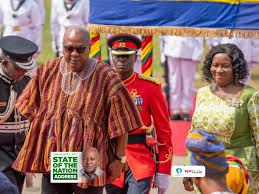Ghanaian President John Dramani Mahama last Thursday announced a raft of social interventions to empower Ghanaians.
Some of the interventions announced in Mahama’s first Message of the State of the Nation will focus on empowering the youth, women, and Persons With Disabilities (PWDs) with jobs and livelihoods, while others focus on comprehensive access to education at all levels.
“The government will launch our flagship national apprenticeship program to equip 10,000 young people in the informal sector with employable skills, including providing apprenticeship fees and start-up kits,” Mahama announced.
As part of the empowerment program, the president said the government’s agencies in charge of transportation regulations would also train and license young people who are into the motorbike taxi business, popularly known in West Africa as Okada.
He said the riders would train in road safety regulations, financial literacy, and digital skills, as well as facilitate their acquisition of motorbikes.
“We will introduce electric motorcycles on a hire purchase scheme to eliminate the use of petrol and make the business more profitable,” the president added.
He said the government would prioritize job creation because, “Youth unemployment has led to despair and frustration. The latest estimates show that up to two million youth are unemployed. This situation poses a major security risk for our country.”
Under a ‘One Million Coders Program,’ he said the government would provide training for young people in coding, web app development, digital marketing, and other digital skills to equip them with the necessary skills for employability in the digital ecosystem.
Mahama added that a program to empower women and PWDs would also come on stream this year under the supervision of Vice President Jane Naana Opoku-Agyemang.
He said the Vice-President’s Empowerment for Women and PWDs would target women, people with disabilities, and other vulnerable groups to build their capacities and offer them access to finance to create jobs.
The president also announced a free tertiary education initiative to improve the country’s gross tertiary enrolment from the current 22 percent compared with a global target of 40 percent by 2030.
The president lamented that although 55 percent of the 460,000 high school leavers qualify for tertiary education annually, only about 161,000, or 35 percent, enroll, leaving over 300,000 without access.
“To address this, the government is introducing a no-fee stress policy to eliminate tertiary admission fees, which currently serve as a barrier to higher education for some students,” Mahama announced.
He added that the policy will receive funding from an enhanced student loan scheme and cover all PwDs who gain admission to tertiary institutions.

